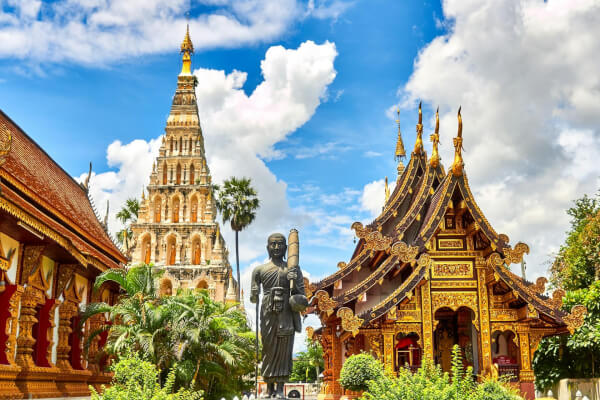Travel to Thailand from the UK: Must-know travel advice
Read our essential guide on travel to Thailand from the UK, featuring must-know travel advice on money, safety, visas, transport and more.

Thinking of working remotely in Thailand? This beautiful country is known for its stunning scenery, fabulous food, as well as its vibrant nightlife.
But before you can set up shop there, you’ll need to get your paperwork sorted. In this guide, we’ll show you how to get a Thailand digital nomad visa as a UK citizen. This will give you legal permission to live, travel and carry out remote work.
We’ll also point out a cost-effective way to manage your money across borders. The Wise account is an alternative to traditional bank accounts. You can send money between the UK and Thailand at the mid-market exchange rate for low, transparent fees*.
A digital nomad is someone who travels freely while working remotely. They tend to work in coffee shops, libraries or co-working spaces.
Digital nomads work while exploring a new country and soaking up the local culture. It can also be a good way to fund travel, as you can earn money as you go.
Yes, but not as tourists. There are two main routes you could take in order to work in Thailand: getting a non-immigrant B visa1 or the Destination Thailand visa, better known as the digital nomad visa2.
Working remotely as a digital nomad and actually having a job in Thailand isn’t the same. Here’s a look at some differences:
| Working as a digital nomad in Thailand | Making money in Thailand |
|---|---|
| Non-resident income tax - only paying tax on what you earn within Thailand if you stay in Thailand for less than 180 days3 | Resident income tax - pay tax on your worldwide income if you’ve permanently moved to Thailand3 |
| You might not need a work permit (DTV visa)4 | You need a work permit1 |
| You need to leave the country every 6 months2 | No need to leave if you have a long-term visa |
Yes, there’s a 5-year digital nomad visa Thailand offers to foreigners. Its official name is the Destination Thailand visa.
The Destination Thailand visa or the Thailand digital nomad visa is a 5-year programme mainly aimed at those who work remotely. The DTV visa is designed for digital nomads, remote workers and freelancers.
The visa fee is £300. There’s a 5-year validity period with a maximum stay of 180 days per entry. If you wish to extend your Thailand digital nomad visa, you can do so for another 6 months.2
You can apply at the Royal Thai Embassy or through the Thai e-Visa website. These are the required documents2:
Here are some other visas available in Thailand:
A tourist visa even UK citizens have to apply for is the multi-entry tourist visa. This is a 6-month visa which allows you to stay in Thailand for 60 days at a time. You must enter Thailand within 3 months of getting it.
These are the documents you’ll need in order to apply:
Keep in mind that tourist visas don’t permit you to work. If you want to work during a shorter stay in Thailand, you’ll need to apply for the 90-day non-immigrant visa.
The application fee for this visa is £150.6
Besides the DTV, another option for digital nomads is the 90-day non-immigrant visa. There are a few different categories of this visa, and the documents you’ll need for your application vary depending which type you choose. You can find out more here.
The visa application fee for the single-entry non-immigrant visa is £60.6
If you’d like to stay in Thailand for longer, there’s the Long-term resident (LTR) visa. This is a 10-year visa which includes the Work-from-Thailand professional category.
The eligibility criteria for this visa is quite restrictive. You’ll need to be a remote worker for a well-established company in a particular industry. There’s a 50,000 THB fee (around £1,100) if you collect your visa in Thailand or £1,500 if you collect it at an embassy.6
Exactly how long you’ll be able to stay in Thailand depends on the visa you have.
As a tourist, you can stay in Thailand for 60 days at a time. If you have a non-immigrant visa, you’ll be able to stay in Thailand for 90 days.
The Thailand digital nomad visa lets you stay in the country for up to 180 days at a time throughout 5 years. The LTR visa allows you to move to Thailand permanently and stay there for up to 10 years.
Here’s a list of average living costs in Thailand:
| Living expense | Cost |
|---|---|
| Meal for 2 (mid range restaurant, three course) | £18.81 |
| Loaf of bread | £1.03 |
| Transportation (monthly pass) | £26 |
| Monthly internet bill | £12.82 |
| 1 bedroom flat in city centre (monthly rent) | £355.72 |
Thailand is a beautiful country with a low cost of living, which makes it perfect for digital nomads. Here are some things you should know if you plan on working there:
Got your Thailand digital nomad visa sorted? This might be the moment to think about how you’ll manage your money in Thailand.
For a one-time cost of just £7 you can get your own Wise card and spend like a local in 150+ countries, including Thailand. It auto-converts the money in your Wise account to the right currency whenever you spend, all at the mid-market rate. You’ll just pay a small conversion fee, or no fee if you already have the currency in your Wise account*.
Why not open an account and use it to pay for your visa costs and spending while in Thailand?
Please see the Terms of Use for your region or visit Wise fees & pricing for the most up-to-date information on pricing and fees.
—
Let’s answer some frequently asked questions about Thailand:
Yes! According to some sources, Thailand is even in the top 3 most popular digital nomad destinations in the world.
Citizens of 31 countries and territories can get a Thailand visa upon arrival, but those coming from 16 of them also qualify for a 60-day visa exemption scheme. Those countries are: Bhutan, Bulgaria, China, Cyprus, Fiji, Georgia, India, Kazakhstan, Malta, Mexico, Papua New Guinea, Romania, Russia, Saudi Arabia, Taiwan and Uzbekistan.
You’ll only pay taxes in Thailand if you live there for more than 180 days a year and you can check the rates here. Thailand and the UK have a double taxation agreement, so you won’t be taxed twice.
At the moment, Indonesia and Malaysia have official digital nomad visas.
Citizens of 93 countries and territories don’t need a visa to enter Thailand, including the UK. You can find the full list on the Thai Consulate website.
In order to enter Thailand as a tourist, you need a valid passport, a round-trip ticket and enough money to cover your stay.
—
Articles you may also be interested in:
—
Sources used:
Sources last checked on date: 16-Aug-2024
*Please see terms of use and product availability for your region or visit Wise fees and pricing for the most up to date pricing and fee information.
This publication is provided for general information purposes and does not constitute legal, tax or other professional advice from Wise Payments Limited or its subsidiaries and its affiliates, and it is not intended as a substitute for obtaining advice from a financial advisor or any other professional.
We make no representations, warranties or guarantees, whether expressed or implied, that the content in the publication is accurate, complete or up to date.

Read our essential guide on travel to Thailand from the UK, featuring must-know travel advice on money, safety, visas, transport and more.

Can I use my Barclaycard in Thailand? Find out here in this handy guide, including fees for using your credit card in Thailand.

Read our guide on the best travel card for Thailand, including card comparisons and travel tips.

Learn how to claim your VAT refund in Thailand with our comprehensive guide, perfect for UK travellers. Discover the VAT refund process to maximise your savings

Can I use my Starling card in Thailand? Find out everything you need to know about using Starling Bank overseas in our handy guide.

Should you pay with cash or card in Thailand? Explore our helpful guide on Thai currency, cash etiquette, ATMs and using your UK card.